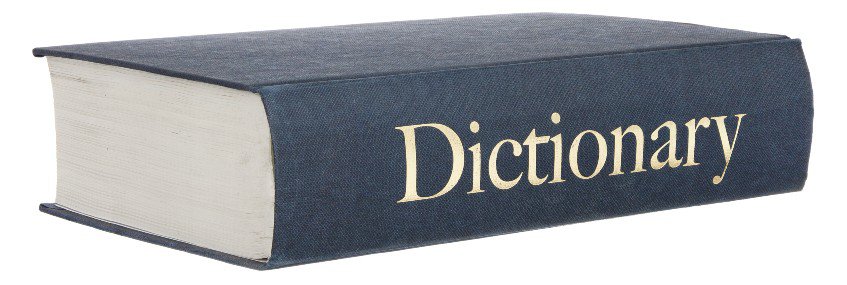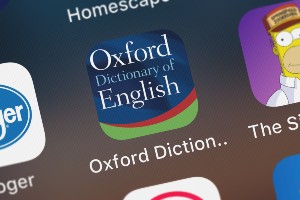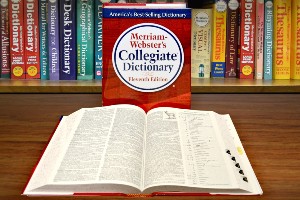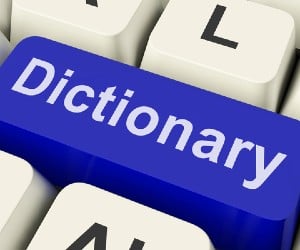About The English Language
For Word Lovers Everywhere!

Dictionary, Thesaurus, Quotes And Poems
Welcome to Real Dictionary! Here you can find word definitions and meanings, thesaurus and synonyms, quotes, poems and more English language related content.
All modern languages are pretty fluid. Yet all languages continue to add new words to their vocabulary influenced by tradition, trends and even technology. New words are needed to better decipher the ever-changing circumstances, language speakers' identities, and local slang.
Modern English dictionaries reflect all the changes the English language experienced through different eras, historical occurrences, and world-changing events.
Many people might remember being astonished by the inclusion of the word "muggle" in the Oxford English Dictionary. This was a term added officially to the dictionary in its 2003 edition. The word "muggle" was the term coined by J.K. Rowling in her first book of the Harry Potter Series back in 1997.
The inclusion of words generated in a fictional novel into formal language seems like a very fantastic idea. However, this serves as a reminder for the students of the English language of how any language evolves by absorbing new words with definite, relatable meanings into its thesaurus.
Under the close supervision of the editors, who regularly study the language and add new words to the dictionaries based on usage, dictionaries have continued to add new words. Internet slang, the pandemic, pop culture, and world politics are some of the most influential topics that have contributed most to the latest additions.
Dictionaries are printed by book publishers, both large and small businesses, and are also more commonly available online like the crossword dictionary, medical dictionary and the Real Dictionary.
What's The History Of Dictionaries?

The history of humankind is rich with instances of works that can be easily referred to as dictionaries. All these writings and publications fulfil the basic requirements of a dictionary and help maintain a record of the prevalent and new words used in the local vocabulary. Dictionaries play an essential part in recording the evolution of culture and language.
Earliest Records of Dictionaries in Various Civilizations
Sumerian (Modern Syria, Iraq): The earliest known dictionaries date back to the Akkadian Empire, around 2300 BCE. They were found on cuneiform tablets with bilingual Sumerian-Akkadian wordlists in Ebla (modern Syria).
China: The earliest surviving monolingual dictionary is Erya, a Chinese dictionary from the third century BCE. Although modern scholars view the Shizhoupian as a calligraphic compendium of Chinese alphabets that originated in the Zhou dynasty, some sources cite it as the oldest Chinese "dictionary," likely composed between 700 BCE and 200 BCE, possibly even earlier.
Greece: The famous Greek scholar, poet, and grammarian Philitas of Cos, from the 4th century BCE, wrote a groundbreaking vocabulary book called Disorderly Words. Although it has been lost, fragments of it can be found in works by other authors. It defined rare Homeric and other literary phrases and words from local Greek dialects and technical terms. In the 1st century CE, Apollonius the Sophist wrote the oldest surviving Homeric lexicon.
India: Amarasimha wrote the first Sanskrit dictionary, the Amarakosa, was published in the fourth century CE. It is written in verse and contains approximately 10,000 words which was expanded upon in subsequent centuries.
Japan: Nihon Shoki, one of the oldest books of Japanese history, states that the first Japanese dictionary is the long-lost Niina, a glossary of Chinese characters from 682 CE. The Tensei Bansh Meiji dictionary, a glossary of written Chinese, was written in or around 835 CE and is the oldest Japanese dictionary still in existence.
Celtic (Modern Ireland): Sanas Cormaic, a dictionary created in the ninth century CE, was one of the first to be used in Europe. More than 1400 words were explained in this Irish dictionary.
Persian (Modern Iran): Frahang-i Pahlavig, or "Pahlavi dictionary," is an Aramaic heterogram dictionary. Its author and date of writing remain unknown. The work's first fragments were discovered in the 9th or 10th centuries BCE. It lists Aramaic words and their Middle Persian translations and Pazend alphabet phonetic transcriptions.
Turkic: The Turkic scholar Mahmud Kashgari completed his most respected work, "Divan-u Lugat'it Turk", in the 12th century. It was a dictionary of Turkic dialects, particularly Karakhanid Turkic. His work is approximately 7500 to 8000 words long and was written to teach non-Turkic Muslims the local language. Another important early Turkic work was by Al-Zamakhshari, who penned "Muaddimetu'l-edeb," a compact Arabic dictionary, for the ruling Turkic-Khwarazm emperor, Atsiz.
Arabic: Many Arabic dictionaries were compiled between the eighth and fourteenth centuries CE. The words in these handwritten works were organized in rhyming order, alphabetical order of the root word, or alphabetical order of Arabic alphabets. Due to its effectiveness and ease of use, the alphabetical order system is still used in modern English dictionaries.
Europe: Medieval Europe also contributed notable works to dictionaries. These were primarily Latin glossaries with definitions in native or simple Latin. The Leiden Glossary, which contained around 800 words in the Abbey of Saint Gall and the Catholicon and was written in 1287 by Johannes Balbus, remained the most famous work of its time. The Catholicon dictionary featured an alphabetical lexicon and was praised and adopted by scholarly circles across Europe. It was also one of the first books to be printed.
English: The earliest English dictionaries contained definitions of Latin terms in English and French. At the start of the Renaissance, the British empire included regions populated by people from many different nationalities. Therefore, simultaneous use of all three languages became a necessity. The need for reference works to explain the languages grew as they were used for various purposes, such as the propagation of religion, politics, and commerce.
Monolingual dictionaries with significant general acceptance and scope first appeared in print around the 17th century. The primary purpose of dictionaries up until this point was to translate. Following their first appearance, monolingual dictionaries evolved to accommodate more subjects.
However, these mainly were compiled to explain unusual words or terminology of specific subjects rather than commonly used words. The notion that dictionaries should include all words in common usage was not accepted by academics until the 19th century.
The diverse nature of cultures that chose to record their linguistic characteristics in the form of dictionaries clearly shows the critical role they play in the propagation of language and culture.
What Are The Most Common Types Of Dictionaries?

In many languages, a single word can have more than one meaning. The same is true for the English language. These variations in a word's meaning or implication have led to the classification of words in various dictionaries. Depending upon the most used meaning, the oldest meaning associated, or even their historical implication, terms and phrases are included in different types of dictionaries.
Specialized Dictionaries
Specialized dictionaries are also known as technical dictionaries. These dictionaries include words associated with a specific field instead of including meanings and examples of these words used in a comprehensive general language lexicon. The specialized dictionaries are further divided into subcategories depending on the subject fields covered.
The Single-Field Dictionary
These dictionaries include terms from a single subject. These facilitate readers by compiling the most significant number of terms relevant to a single field without spanning multiple volumes. Single-field dictionaries may include linguistic and extra-linguistic terms related to a field. The most commonly used specialized dictionaries are law, economics, and engineering.
The Subfield Dictionaries
The subfield dictionaries include words that are even more specific to the sub-field of any particular field. They are compiled by professional field-related editors to include words that have meaning exclusive to the specific subfield. For example, constitutional law dictionaries for law students or welding dictionaries for engineers.
Multi-Field Dictionaries
A multi-field dictionary is one that broadly covers at least two or more subjects that fall under the same area—for example, marketing dictionaries, insurance dictionaries, or banking dictionaries.
The American National Biography is the perfect example of a single-field dictionary. At the same time, the African American National Biography Project can be called a subfield dictionary as it further classifies the subjects under discussion. These dictionaries are also referred to as "maximizing dictionaries" for maximizing the coverage of terms in a specialized field or "minimizing dictionaries" for limiting the scope of a field to better cover the terms from the smaller sub-sections of that field.
Multi-field dictionaries come under the minimizing dictionary label, providing wider coverage across subject fields. The Oxford Dictionary of World Religions is an excellent example of minimizing dictionaries. In comparison, single-field and sub-field dictionaries maximize coverage within a particular subject area, with The Oxford Dictionary of English Etymology serving as an excellent example.
Defining Dictionaries
Defining dictionaries is the most rudimentary form of a dictionary. They have been compiled to provide an essential glossary of the most basic definitions and their many of their underlying concepts.
More complex English language concepts can be explained and defined using these dictionaries, particularly for those who are just starting to learn a language. Many defining dictionaries usually include one or two meanings for each word featured in them, and fewer than 2000 words are present in total. However, some versions can also contain up to 4,000 of the most common English idioms and metaphors.
Descriptive Or Prescriptive Grammar
Prescriptive grammar is the set of guidelines that specify the preferred use of language. The most commonly used American and British dictionaries, including the Oxford English Dictionary and Merriam-Webster, use a descriptive approach to define words. That is, they provide descriptions of the word's actual uses with reference to its meaning.
In addition, there is a separate reference to the implied attitudes of the word choice in particular settings. This information can clarify situations where the use of a specific word can be seen as offensive, illiterate, or vulgar.
This additional information is either provided under "usage notes" or added in italic font under the definition.
Historical Dictionaries
A Historical Dictionary also referred to as a Dictionary on Historical Principles, is a particular descriptive dictionary category that traces words' evolution over time. It provides the modern meaning of the word along with its historical forms and meaning evolution. The historical dictionaries support their findings and definitions with citations to the source information. These dictionaries are little treasures of knowledge for language scholars, and they are also quite helpful in understanding the deeper nuances of a word's semantic change.
Dictionaries For Natural Language Processing
The modern world is turning to computers and smart devices, which have, for all intents and purposes, become everyday devices, often replacing traditional forms of knowledge syndication like books and other paper-published materials. Natural Language Processing dictionaries are machine-readable dictionaries that are accessed via computers.
The end users are humans, but the information is stored in a machine-readable form rather than the usual linear alphabetical formats followed in typically published dictionaries. The Lexical Markup Framework (LMF) is used to better organize lots of data being processed to access the Natural Language Processing dictionary entries.
Collegiate Dictionaries
The labels "collegiate" or "college" emphasize the smaller size and lower price of these dictionaries rather than the content included. Compared to their full-size counterparts, these dictionaries typically have fewer words and definitions per word. The limited word entries enable the publishers to keep the size and price under stricter control.
However, as they are mainly targeted toward students, they also include additional information that college students would find helpful, like biographical or geopolitical details. The collegiate dictionaries undergo more revisions than any other printed dictionary, so they offer much more up-to-date language definitions and phrases included.
Bilingual Dictionaries
Bilingual dictionaries are more commonly referred to as translation dictionaries. Non-native language speakers prefer these dictionaries. Bilingual dictionaries are printed stubby books available in various sizes with varying numbers of the most used words and their definitions. These can be unidirectional or bidirectional, meaning they can either include the meanings of words in the translated language or in the case of bidirectional, they contain the translated meaning along with its definition and phrases.
Bilingual dictionaries also have other important information to help readers assess word usage. This includes the word's parts of speech, grammatical gender, declension model, and other important grammatical identifiers.
Learner's Dictionaries
The Learner's Dictionaries, like the Bilingual Dictionaries, are primarily arranged and compiled for the use of new language learners; however, they do not contain the translated meaning in any other language. Compared to full-size or collegiate dictionaries, these dictionaries have far fewer entries but more information that any learner of English would find helpful.
They frequently include more detailed usage notes, appropriate collocations, illustrative sentences, and phrases. These dictionaries can help readers learn British and American pronunciations as well as multiple variations. To facilitate ease of use, definitions are typically limited to a simpler and more basic vocabulary, and the International Phonetic Alphabet (IPA) is used to demonstrate pronunciation.
The Monolingual learner's dictionary and the Advanced learner's dictionary are the two most commonly used variations of Learner Dictionaries. They are intended to be the next stepping stones for language learners after Bilingual Dictionaries as they gain proficiency in the language.
Encyclopedic Dictionaries

Typically, a dictionary only offers a limited amount of information and is primarily concerned with words and their definitions. Encyclopedia entries, on the other hand, strive to convey all of the knowledge that has been accumulated on each subject by going into greater detail. Encyclopedias usually contain lengthy monographs on specific subjects, which is a direct contrast to dictionary entries.
The Encyclopedia Dictionaries accumulate these traits with tweaks to make them more convenient and affordable. When compared to any standard dictionary, the encyclopedic dictionary provides a more comprehensive description and a wider selection of entries chosen to convey a broader range of information.
When compared to an encyclopedia, it provides convenience through summarized definitions and explanations. They usually cost less to publish and buy because they are much smaller in size than traditional encyclopedias.
An encyclopedic dictionary typically covers a wide range of topics, is alphabetically organized, and contains numerous short listings. The articles in encyclopedic dictionaries can be general, covering a wide range of subjects, or they can be focused on a single subject, such as philosophy, law, medicine, biography, or the history of art. In addition, they could be arranged according to a specific academic, cultural, ethnic, or national viewpoint.
What Is The History Of British English Dictionaries?

The earliest records of dictionaries in Great Britain can be found in the year 1200. It was a short collection of words written by a Medieval grammarian, Johannes de Garlandia, also known as John of Garland. This book, titled "Dictionarius," was written to help his students learn and distinguish the terms used for different trades and tradesmen working in Paris.
The Dictionarius was written in Latin, with the interlinear glossed text written in French. The word "dictionarius" is believed to be the origin of the English term "dictionary," as well as of many similar words used in other modern languages.
Another well-known example of an early dictionary is "Elementarie" by Richard Mulcaster in 1582. This was a non-alphabetical list of 8000 English words, written as a pedagogical guide to make English a more accessible and respected language. This publication was an attempt to elevate the English language compared to Latin, which was the dominant learning language at the time.
In 1604, an English schoolteacher, Robert Cawdrey, published "A Table Alphabeticall." This book is considered to be the first purely English alphabetical dictionary. Although this dictionary and the numerous other works that copied its format and content were not regarded as trustworthy resources for learning the language, they nonetheless represented a significant advancement in the creation of a dependable and expertly edited English dictionary.
The 16th century saw several other disrupted attempts in the form of "Glossographia" by Thomas Blount, "The New World of English Words: Or a General Dictionary" by Edward Phillips, which was basically a plagiarized version of Thomas Blount's publication, "Real Character and a Philosophical Language" by John Wilkins, and "English Dictionary" by Elisha Coles.
However, it wasn't until 1755 that a well-received and reliable dictionary, "A Dictionary of the English Language," by Samuel Johnson, was published. Johnson's masterpiece is considered the first to combine all of the elements required in an intelligible dictionary, making it the first modern dictionary.
Until the publication of the "Oxford English Dictionary" by Oxford University Press almost one and a half centuries later, Samuel Johnson's dictionary remained the most used and trusted English-language standard.
The modern "Oxford English Dictionary" was initially published in a collection of 12 volumes in 1828. Its second edition, containing 20 volumes, was published in 1989, and since then, it has been revised and updated every three months by a team of dedicated editors. The third edition is currently almost halfway through. However, it is doubtful to be published in the printed version. According to the Chief Executive of Oxford University Press, it will most likely be released in electronic form only.
What's The History Of American English Dictionaries?

Noah Webster's "A Compendious Dictionary of the English Language," published in 1806, is the first documented American dictionary. Following its first publication, Webster began the painstaking task of expanding and compiling this dictionary, which spanned over twenty-seven years. He completed this extensive work in 1825 and published it in 1828.
The new edition of Webster's American English dictionary contained seventy thousand words, of which twelve thousand had never been included in any prior printed dictionaries. These new words included American phrases like "skunk" and "squash" that were not present in the British dictionary at that time. He also reformed complex spellings, since he believed in simplifying the overly complicated spelling rules that were followed at the time.
In Webster's American English, "favour" became "favor", "centre" became "center", and "defence" was replaced by "defense". These are just a few examples of words with the same pronunciation but different spellings.
After being acquired by G & C Merriam Co. in 1843, the Merriam-Webster Dictionary was purchased by Encyclopedia Britannica in 1964. It is currently recognized as being America's best-selling dictionary. Its 11th edition was published in 2012 and includes over 225,000 words and 42,000 usage examples.
The Longman Dictionary of American English 5th Edition (2014), The New Oxford American Dictionary 3rd Edition (2010), and The American Heritage Dictionary of the English Language 5th Edition (2011) are some other notable American English dictionaries of modern times.
Where Do I Find Word Definitions At The Real Dictionary?

Start your word search and find the definitions and meanings of English words using the Real Dictionary index below: